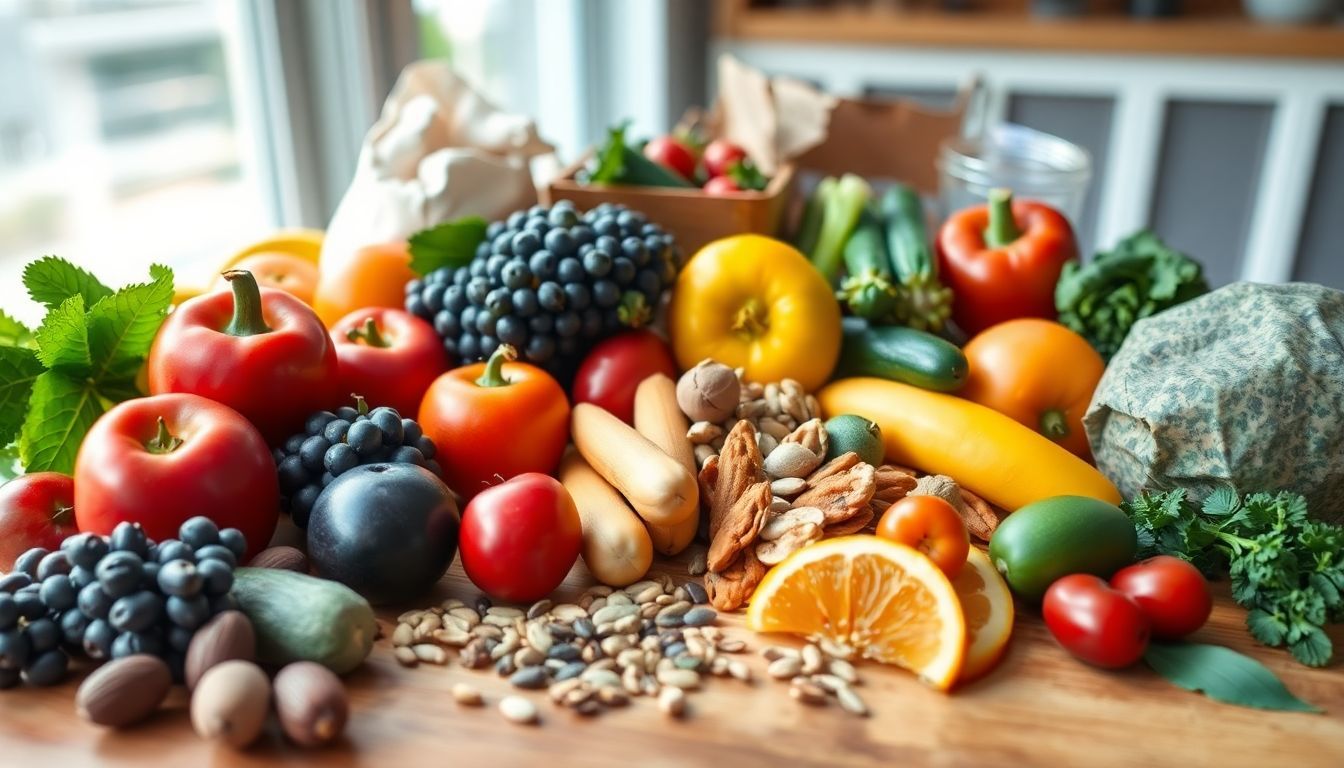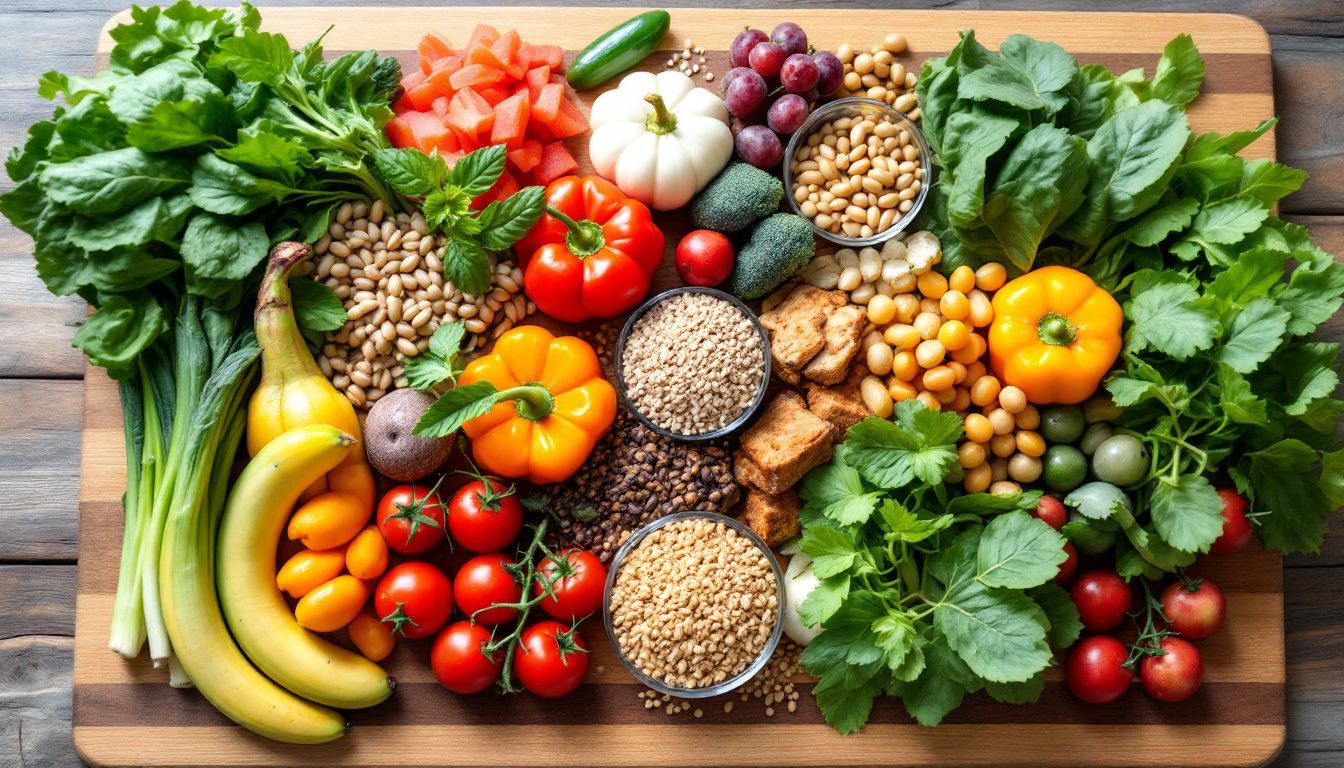Feeling tired or stuck with unhealthy meals? A plant-based diet can boost your energy and overall health. It’s packed with fruits, vegetables, whole grains, and plant-based proteins that help fight diseases like heart disease and type 2 diabetes.
Thank you for reading this post, don't forget to subscribe!Keep reading for easy tips and big benefits!
Key Takeaways
- Plant-based diets lower heart disease risks by 24% and improve cholesterol levels. They also reduce chances of type 2 diabetes, stroke, and some cancers.
- Foods like leafy greens, nuts, beans, and sweet potatoes provide essential nutrients like fiber, vitamins A and C, protein, and omega-3s. Vegans may need a B12 supplement.
- Prebiotics in foods like garlic, onions, and bananas feed good gut bacteria. These help control cravings and may support weight loss over time.
- Avoid processed plant-based items like vegan nuggets or sugary drinks. Focus on whole grains, fresh fruits, vegetables, nuts, and seeds for better health benefits.
- Start with one plant-based meal daily using simple swaps like oatmeal with fruit or lentil soups to build lasting habits easily!
Key Health Benefits of Plant-Based Meals
Eating plant-based meals can greatly improve your overall health. They support a stronger body and help lower the chances of getting serious illnesses.
Improved cardiovascular health
Plant-based diets are great for heart health. Studies show vegetarians have a 24% lower risk of dying from ischemic heart disease. The Mediterranean diet, full of fresh herbs, olive oil, and whole grains, helps reduce the chance of coronary heart disease.
These diets cut down on saturated fat from animal products and improve cholesterol levels.
Foods like leafy greens, nuts, seeds, and beans support healthy blood pressure. High fiber in plant-based foods keeps arteries clear by lowering bad cholesterol. Less reliance on processed foods also reduces sodium intake—helping manage high blood pressure and weight.
Healthier hearts start with simple choices like adding more fruits and vegetables to meals!
Reduced risk of chronic diseases
A healthy heart isn’t the only reward of plant-based eating. Switching to a diet full of whole foods, fruits, and veggies can lower risks for many chronic diseases. Research shows vegetarian diets help reduce high blood pressure and type 2 diabetes.
People who eat this way may have a lower risk of coronary heart disease, stroke, and even certain mental health problems.
Cancer prevention is another benefit tied to plant-forward eating—though no single food stops cancer alone. Whole grains like quinoa or brown rice, leafy greens like spinach, and sweet potatoes give your body essential vitamins and minerals it needs to stay strong against illness.
The Mediterranean diet has also been linked to reduced cases of metabolic syndrome and diabetes over time… proving that mindful choices really matter!
Enhanced nutrient intake
Plant-based meals are packed with nutrients like fiber, vitamins, and minerals. Whole grains, fruits, vegetables, nuts, and seeds give your body essential nutrients for energy and health.
Sweet potatoes provide vitamin A for eye health. Black beans deliver protein and iron to support your muscles.
Eating a variety of plant-based foods boosts nutrient intake even more. Green leafy vegetables offer calcium while soy products add healthy fats such as omega-3s. Phytonutrients from plants reduce inflammation in the body.
Vegans might need a B12 supplement as this vitamin is missing from plant sources.
Tips for Starting a Plant-Based Diet
Switching to a plant-based diet can seem tricky, but small changes make it easier. Focus on adding tasty, whole foods like veggies and grains to your meals for a strong start.
Begin with one plant-based meal a day
Start small with just one plant-based meal each day. Swap your usual breakfast for oatmeal topped with fresh fruit and nuts. Try a lunch of black beans, sweet potatoes, and leafy greens in a wrap or bowl.
Making these simple changes can help you lower risks of heart disease, type 2 diabetes, and high blood pressure over time.
Enjoying a Mediterranean-inspired dinner? Use olive oil to sauté zucchini noodles for a nourishing stir-fry packed with healthy fats. Include whole grains like quinoa or brown rice as staples.
This gradual shift makes it easier to adopt healthier diets full of fruits and vegetables—leading naturally into more variety!
Incorporate whole grains, fruits, and vegetables
Whole grains like whole wheat, quinoa, and brown rice provide fiber, vitamins, and minerals. These support heart health and aid weight management. Fruits such as berries or sweet oranges bring antioxidants that may lower the risk of cancer and type 2 diabetes.
Vegetables like leafy greens or zucchini pack nutrients to improve overall heart health.
Adding a colorful mix of fruits and vegetables can also boost energy levels. Sweet potatoes offer potassium, while green beans deliver vitamin C for immunity. Combining these with minimally processed foods adds variety without sugary drinks or ultra-processed snacks.
This keeps meals healthy yet satisfying!
Ensure proper protein sources like beans and lentils
Beans and lentils are great sources of plant-based protein. They provide 7 to 20 grams of protein per serving, making them an excellent alternative to meat. Black beans, chickpeas, and red lentils offer protein along with fiber that supports digestion.
These foods are beneficial for your heart and may reduce the risk of chronic illnesses like coronary heart disease.
Combine beans or lentils with whole grains like quinoa or brown rice for complete meals. Use the “bowl method” by pairing legumes with leafy greens and sweet potatoes for balanced nutrition.
Lentil soups or black bean burritos make simple, nutritious options… Next comes how prebiotics in plant-based foods can help curb cravings!

The Role of Prebiotics in Plant-Based Foods and How They Help Control Cravings
Prebiotics, found in plant-based foods like garlic, onions, and bananas, feed good bacteria in the gut. These bacteria support the gut-brain axis, which links digestion to brain function.
A study with 59 overweight adults showed how prebiotics might lower food cravings. Participants who took 30 grams of inulin—a type of prebiotic—daily for two weeks had reduced brain activation for high-calorie foods during MRI scans.
This means prebiotics can help control cravings by influencing brain signals related to rewards from sweets or fatty snacks. High-fiber options like whole grains and black beans are rich sources of prebiotics.
Eating them keeps you full longer while nourishing your gut health. Over time, this may aid weight loss and improve overall well-being.
Maintaining a Balanced Plant-Based Diet
Eating plant-based can be simple with the right habits. Focus on fresh options, and pay attention to your nutrient needs for a healthy balance.
Avoid processed plant-based foods
Processed plant-based foods, like vegan nuggets or packaged veggie burgers, often contain added sugars, unhealthy fats, and preservatives. These ultra-processed options may harm heart health and increase high blood pressure risks.
Stick with whole foods like leafy greens, black beans, sweet potatoes, and nuts for better nutrition.
Limiting refined ingredients improves your diet’s quality. Replace items like fruit juices with fresh fruits or smoothies made at home. Minimally processed options—such as zucchini noodles or peanut butter without added sugar—support weight loss and overall health benefits.
Whole grains and plant-based proteins also provide sustainable energy without the downsides of heavily processed alternatives.
Focus on meal prep and variety
Prepping meals ahead saves time and keeps your plant-based diet on track. Cook in batches—make black beans or lentil soups for easy lunches. Prep leafy greens, roast sweet potatoes, and chop veggies for quick dinners.
Store them in airtight containers to stay fresh all week.
Add variety to avoid boredom. Try zucchini noodles with olive oil one day and cinnamon-roll overnight oats the next morning. Use local ingredients like fresh herbs or whole grains to keep flavors exciting.
Mixing plant-based protein sources like peanuts, soybeans, or yogurt ensures a balanced meal plan… Next up: prebiotics in plant foods!
Conclusion
Plant-based meals can transform your health and lifestyle. They lower risks of heart disease, diabetes, and cancer while supporting weight management. Simple changes—like adding fruits, vegetables, and whole grains—can make a big difference.
Focus on fresh foods, variety, and balance for lasting benefits. Start small today… your heart (and taste buds) will thank you!
